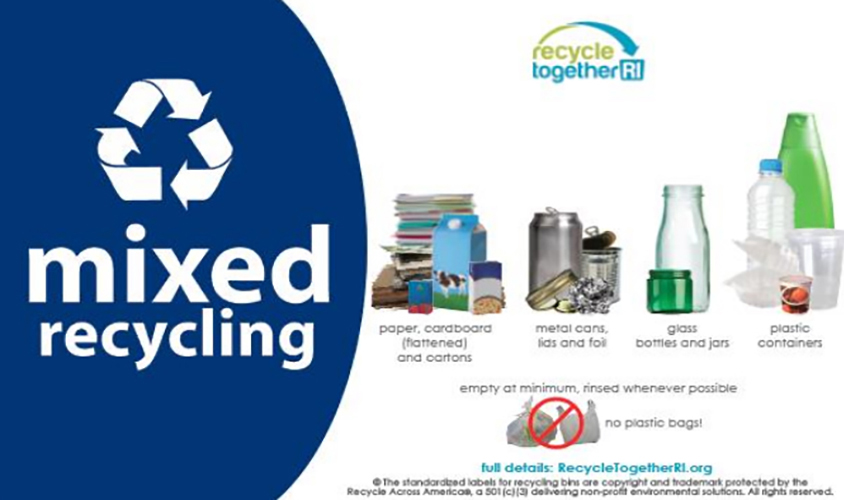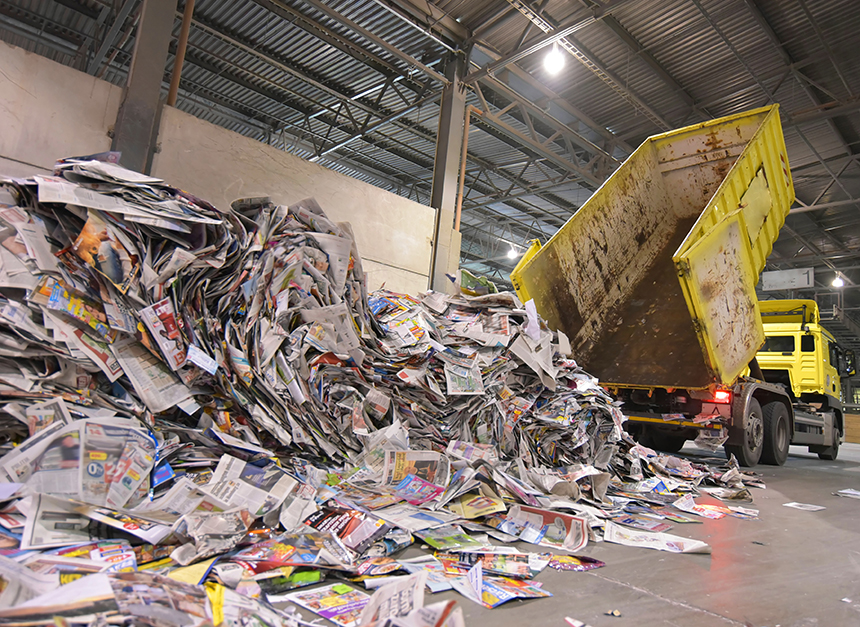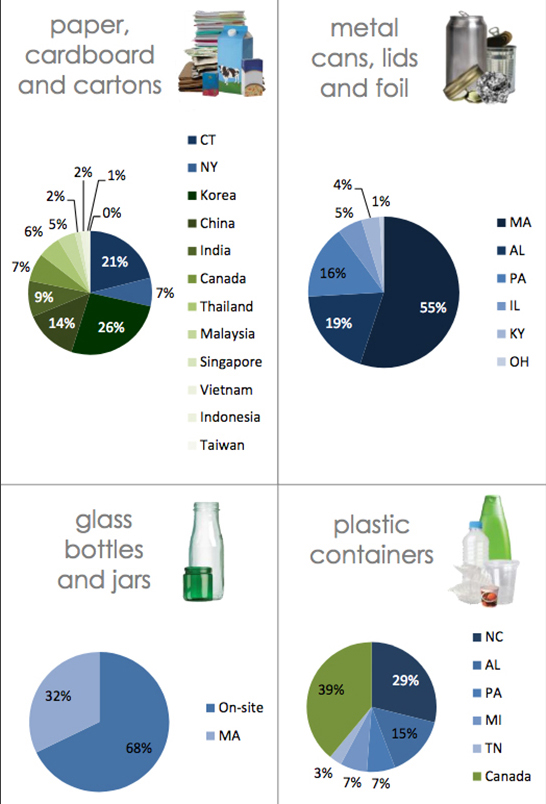By FRANK CARINI/ecoRI
News staff

EDITOR'S NOTE: You can recycle your electronic waste this Saturday, June 1, at the Charlestown Mini-Mart from 9 AM to 12 noon. We are lucky to have Charlestown-based Indie-cycle doing this with the Mini-Mart on a regular basis. CLICK HERE for Indie-Cycle's schedule for Charlestown and other towns across the state. And CLICK HERE for my article about Indie-Cycle. -Will Collette.
The impacts of climate change in the form of water from frequent and heavy rains has found its way into curbside recycling bins, but that’s not the biggest threat to the materials’ marketability.
Another human activity —
the inability to follow rules — is cause for greater concern. It’s hampering
Rhode Island’s ability to get the most, both economically and environmentally,
out of these collected materials.
The rules to recycling in Rhode Island
are simple and straightforward, but because of polar-opposite actions — not
giving a damn or caring too much — 17 percent to 20 percent of the state’s
collected recyclables are contaminated and have to buried in the ever-crowding
Central Landfill.
The Rhode
Island Resource Recovery Corporation (RIRRC) manages the state’s
waste and recycling streams. The state’s mixed recycling program accepts —
either in curbside bins or at municipal transfer stations — four categories of
materials:
Fiber: paper, cardboard, and cartons. Paper and
cardboard should be mostly clean and dry — a little grease on a pizza box, for
example, is fine — and be flattened. Cartons must be empty, and rinsed whenever
possible. No shredded paper, napkins, tissues, or paper towels.
Metal: cans, lids, and foil. Containers must be empty,
and rinsed whenever possible. Foil should be clean and bunched up. No other
metals — i.e., frying pans, chains, or engine blocks — should be placed in a
recycling cart.
Glass: bottles and jars. Containers must be empty, and
rinsed whenever possible. Remove metal tops from glass bottles and jars and
recycle separately. No other glass — i.e., drinking glasses, glass
paperweights, glass windowpanes, or eye glasses — should be placed in a
recycling bin.
Plastic: bottles, jugs, and containers, including flower
pots. Containers must be empty, and rinsed whenever possible. Place plastic
tops back on to containers prior to recycling. No other plastic — i.e., clothes
hangers, hoses, or pipes — should be placed in a recycling bin.
In fact, much of what is plastic isn’t recyclable under the mixed recycling program.
Plastic bags and film are the biggest problem. They’re an “operational nightmare,” as the tangle up recycling equipment. These items are recyclable, just not at the curbside or at a transfer station.
Also, no styrofoam, or containers that held flammable materials or oily chemicals such as motor oil, antifreeze, pesticides, or herbicides. The chasing-arrows symbol stamped on many plastics doesn’t mean the item is curbside/transfer station recyclable. Pay it no attention.
In fact, much of what is plastic isn’t recyclable under the mixed recycling program.
Plastic bags and film are the biggest problem. They’re an “operational nightmare,” as the tangle up recycling equipment. These items are recyclable, just not at the curbside or at a transfer station.
Also, no styrofoam, or containers that held flammable materials or oily chemicals such as motor oil, antifreeze, pesticides, or herbicides. The chasing-arrows symbol stamped on many plastics doesn’t mean the item is curbside/transfer station recyclable. Pay it no attention.
Christmas lights, dirty
diapers, fish heads, rope, concrete, asphalt, cinderblocks, and tires are among
the other items that are inappropriately placed in recycling bins.
Another unwelcome item
wreaking havoc on Rhode Island’s recyclables is rain, from more frequent and
intense storms caused by climate change. It’s being captured in emptied
recycling carts waiting on the curbside to be collected. This water is often
left in the cart, and contaminates the material collected during the following
week.
“One of the other
challenges we have is moisture and storminess,” said Marcel Lussier,
coordinator of the landfill’s Materials Recovery Facility
(MRF). “Storminess blocks our ability to sort inbound material. It would be
helpful if the citizens of Rhode Island would be mindful of that and try to
keep their material dry. … I believe climate change has some impact. We get
more rain than we used to.”

The price for mixed
paper recycling dramatically declined when China changed its policy two years
ago. (istock)
Market maneuvering
In late 2017, the recyclables market, which is in a state of flux anyway, shifted dramatically, when China set tougher standards for contamination levels in the recyclables it imports. Under this new policy, China now rejects recycling bales with more than 0.5 percent impurities. This, plus a ban on imports of recycled PET, PE, PVC, and PS plastics, in effect, eliminated the single-largest market for U.S. recyclables.
In late 2017, the recyclables market, which is in a state of flux anyway, shifted dramatically, when China set tougher standards for contamination levels in the recyclables it imports. Under this new policy, China now rejects recycling bales with more than 0.5 percent impurities. This, plus a ban on imports of recycled PET, PE, PVC, and PS plastics, in effect, eliminated the single-largest market for U.S. recyclables.
The market for Rhode
Island recyclables was impacted, but not as much as other states and regions.
Currently, RIRRC is paying $13 a ton to International Forest Products LLC
to take collected mixed paper. Fourteen months ago, RIRRC was paying $23 a ton
to get rid of its mixed paper.
There is no current
market for glass, which is less about Chinese policy, though,
and more about a changing marketplace. RIRRC is using collected glass as daily
cover on the Central Landfill.
The quasi-public agency would require a dispensation from the Rhode Island Department of Environmental Management to landfill any mandatory recyclables. Massachusetts also bans recyclable materials from being landfilled without a waiver from the state.
More importantly,
though, future demand for mixed recycled paper and glass may change, and Jared
Rhodes, RIRRC’s director of policy and programs, wants Rhode Island to be
positioned to take advantage. He said that is why he wants people to keep
recycling fiber and glass.
Four RIRRC employees —
Katherine Hypolite, communications coordinator, Krystal Noiseux,
education/outreach manager, Rhodes, and Lussier — recently met with ecoRI News
to talk about recycling in Rhode Island. They all stressed quality is key and
the best way to deal with China’s abrupt turn and stay competitive in the
marketplace.
“We’re at the mercy of
the quality of what’s coming into the building,” Lussier said. “If that
continues to erode, we may find ourselves in the same position as some of the
other MRFs in the country that cannot compete and the mills that are buying the
material they may say, ‘Sorry Rhode Island, but your stuff isn’t where it needs
to be.’”
High contamination can
cause entire loads of recycling to be rejected and sent to the landfill. Lesser
contamination can impact the purity of recycling bales, making them undesirable
to buyers. A bad reputation makes it difficult to secure markets for recycled
materials. Lussier said Rhode Island’s reputation is good, “upper echelon,” but
purity can always be improved, which is why the MRF has slowed the line and
invested in technology to better sort recyclables.
Rhode Islanders can do
their part by following the simple rules to recycling.
“There’s two types of
contamination. There’s the ‘I’m not really participating in the program at all
and I’m using these carts for whatever. I’m just putting everything out and,
when I run out of room in this one, it’s going into this one.’ So there’s that
type of contamination,” Noiseux said. “The more broad contamination is the
thought that just because something is made of plastic, metal, glass, or came
from a tree therefore it must be recyclable.”
Noiseux blamed part of
the latter problem on the fact “there’s plenty of recycling bins out there that
will have very generic labeling on them, that will have the chasing-arrows
symbol, and they’ll say plastic, metal, glass, and paper. There’s a lot of
confusing signage still out there.”
RIRRC is trying to
overcome the past’s broad signage issues by implementing a state standardized
labeling system, something the Let’s Recycle Right! campaign
has been pushing.
The Rhode Island
Resource Recovery Corporation keeps track of where its recyclable material
initially goes. The percentages above are for 2018. (RIRRC)
Recycling matters

While the market is currently slow for glass and mixed paper, there remains a solid market for recycled materials that are relatively free of contamination.
In fact, Rhodes said, “Recycling is alive and well in Rhode Island. It’s meaningful and it still works here.”

While the market is currently slow for glass and mixed paper, there remains a solid market for recycled materials that are relatively free of contamination.
In fact, Rhodes said, “Recycling is alive and well in Rhode Island. It’s meaningful and it still works here.”
He noted that the MRF
gets about 100,000 tons of material recycled annually.
Here is a closer look at
how Rhode Island’s four categories of recyclables are used:
Fiber: While Robert Kraft-owned International Forest Products is being paid $13 a ton to take RIRRC’s mixed paper recycling, Lussier said there is still a need for the material.
He said he’s surprised there’s a negative cost associated with it, but expects the laws of supply and demand to change the situation.
“The value of it has
gone down dramatically and that’s kind of a mystery,” Lussier said. “Even
though China has said no we don’t want the material to come to us, as far as we
know there’s still a demand for it. The laws of supply and demand should hold
true.”
Some 18 months ago,
before China dramatically revamped its recycling policy, RIRRC was being paid
between $50 and $90 per ton for mixed paper recycling.
In the time since China changed its policy, the price for mixed paper has been on the plus side for a little while, at zero for a while, and on the negative side much longer than MRFs would like.
In the time since China changed its policy, the price for mixed paper has been on the plus side for a little while, at zero for a while, and on the negative side much longer than MRFs would like.
A new demand, however,
is beginning to develop. In January and February, for example, mills used 4.4 percent more mixed paper
than they did during the first two months of 2018.
In April, at the 2019 WasteExpo in Las Vegas, a paper consulting firm told those gathered that while pricing for mixed paper has been depressed demand for old corrugated containers, better known as cardboard, will outpace supply in the future and that other fiber grades, such as mixed paper, will be needed.
In April, at the 2019 WasteExpo in Las Vegas, a paper consulting firm told those gathered that while pricing for mixed paper has been depressed demand for old corrugated containers, better known as cardboard, will outpace supply in the future and that other fiber grades, such as mixed paper, will be needed.
“We’re starting to see
more investment in the mixed paper industry here in the states,” Rhodes said.
“The investment in mixed paper is starting to change and increase. Hopefully,
at some point we’ll get to a point when paper is profitable again.”
Recycled fiber is used
to make paper towels, facial tissues, bathroom tissues, “giant” rolls of paper,
and new cardboard.
Metal: RIRRC has seen some recent changes in the
demand for aluminum used beverage cans (UBC), including a 28 percent reduction
in price for the first quarter of this year compared to the first quarter of
2018.
Much of the change in
UBC demand is tied to the automobile industry. Post-industrial scrap is more
desirable when stamping new auto parts than UBC aluminum, as it is a cleaner
product to recycle.
In April, RIRRC was being paid $348.90 per ton for metals. This recycled material is used to make rebar, tin cans, and sheets for various metal products. Much of this material ultimately ends up in Turkey, according to Lussier.
Glass: Unlike plastic, glass is nontoxic and can be
recycled again and again. But plastic is cheap to make, ship, and store,
prompting beverage-makers to turn to plastic as a way to boost profits and, in
turn, collapsing regional demand for recycled glass.
In Rhode Island, the collection of glass bottles and jars has dropped in recent years, from some 23,000 tons to about 9,000 tons annually, as more plastic is being used in food and beverage production.
To deal with the
decreasing demand for recycled glass and help save RIRRC on operating costs,
the General Assembly last year approved a bill that allows RIRRC to use crushed
glass as landfill cover.
While using collected glass for this purpose isn’t the “highest or best use” of the material, it does save RIRRC money and it is a “beneficial use,” as it replace a portion of the 6-inch layer of low-grade soil dumped daily to cover waste deposited in the Central Landfill, to control debris, odors, and pests.
Using collected glass as cover is a practice common in waste-disposal operations. The General Assembly had removed glass in 2011 as an acceptable material for the daily cover after a protracted odor problem at the landfill.
If glass hadn’t been
approved again as a cover material, it would be being buried in the landfill
instead.
Plastic: Despite China’s upending of the plastics
marketplace, Rhode Island isn’t struggling to find buyers for its collected
material. Lussier noted that RIRRC never relied on exporting its plastic
commodities. He said there is more volatility in pricing and some plastic
resins have been harder hit than others.
RIRRC sells its
collected plastics to facilities in the United States and Canada.
In April, RIRRC was
being paid $296.44 per ton for plastics. This recycled material is used to make
carpeting and fleece, among other products, and some is broken back down into
its chemical form.
Reduce and reuse
While RIRRC stresses source reduction and reuse first, its employees spend plenty of time educating the public about recycling properly.
On May 1, RIRRC rebooted its Let’s Recycle Right! campaign, designed to reduce contamination of recycled materials.
Hypolite said the key is to keep repeating the same, consistent recycling message across the state.
While RIRRC stresses source reduction and reuse first, its employees spend plenty of time educating the public about recycling properly.
On May 1, RIRRC rebooted its Let’s Recycle Right! campaign, designed to reduce contamination of recycled materials.
Hypolite said the key is to keep repeating the same, consistent recycling message across the state.
.JPG) |
| Phyllis Hutnak of Charlestown-based Indie-Cycle (photo by Will Collette) |
These labels are being placed on curbside carts, being passed out at public schools and businesses, and being given to municipalities.
The MRF also hosts 200
tours of the facility annually, and RIRRC conducts 150 more off-site recycling
programs every year.
Noiseux said there is a
simple motto to remember if you are unsure about an item: “When in doubt, find
out or throw it out.”
Many items that aren’t
recyclable at the MRF can be recycled by others. There is a market, for
instance, for TVs and other electronic waste. Rhode Island-based Indie Cycle
holds e-waste collections on a
regularly basis, and takes most items for free.